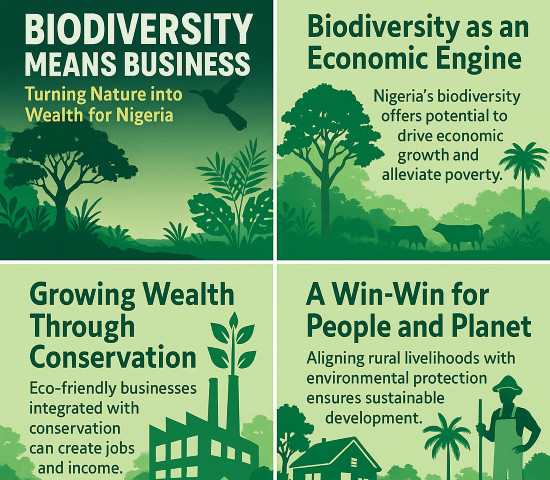Experts: Biodiversity Businesses Can Power Conservation, Create Jobs, and Build Sustainable Wealth in Nigeria

Nigeria’s growing biodiversity sector holds the potential to create jobs, generate wealth, and safeguard the nation’s natural ecosystems, according to experts and conservation stakeholders.
Speaking at the Biodiversity Business Training for 12 communities within the Oban Biosphere Reserve — hosted at the Cross River National Park, Akamkpa — experts said biodiversity businesses can transform how communities interact with nature, turning conservation into an engine for economic empowerment and climate resilience.
From Forests to Finance: Turning Nature into Sustainable Enterprise
Biodiversity businesses are commercial ventures that generate profit while protecting the environment, ensuring sustainable use of biological resources and equitable sharing of benefits among local communities.
The initiative is part of the Nigeria–UNESCO Biodiversity Project, supported by the India–UN Development Partnership Fund, and implemented in collaboration with the Federal Ministry of Environment, Forestry Research Institute of Nigeria (FRIN), and the National Park Service.
According to Dr. Zacharia Yaduma, Director-General of FRIN, the goal is to help forest-dependent communities build alternative livelihoods that reduce pressure on natural reserves.
“These communities rely on the forest for firewood, food, and income. We can’t just ask them to stop — we must provide alternatives that sustain both people and the planet,” Yaduma explained.
“Once they begin to earn income from eco-friendly ventures, tree-cutting and wildlife hunting will reduce significantly.”
He added that conservation-driven entrepreneurship would also promote ecotourism, attracting visitors, foreign exchange, and new opportunities for rural development.
Protecting Forests, Powering the Future
Prof. Morenike Ojo, Head of the Elizabeth Ehi-Ebiewele Biodiversity Linkage Centre, FRIN Ibadan, emphasized that biodiversity conservation is a frontline strategy against climate change.
She warned that deforestation, industrialization, and poor waste management are eroding Nigeria’s natural resilience, causing erratic rainfall, food insecurity, and rising temperatures.
“Tree planting and habitat restoration are not just environmental acts — they’re investments in our survival,” Ojo said.
“Trees regulate temperature, improve air quality, and sustain the delicate balance of the ecosystem.”
Nature’s Wealth: Food, Medicine, and Stability
Environmental expert Dr. Okeyoyin Agboola, a member of the project’s steering committee, highlighted that biodiversity provides food, medicine, clean water, and ecological balance — all vital to human survival and economic stability.
“If we lose our forests, we lose wild foods, medicinal plants, and the balance that sustains life,” Agboola warned.
“Conservation fuels ecotourism, attracts international visitors, and creates green-collar jobs. That’s the future Nigeria should embrace.”
Rainforests: The Lungs of the Earth
Prof. Raphael Offiong of the University of Calabar’s Department of Geography and Environmental Science described Nigeria’s tropical rainforests as “the lungs of the earth.”
“The day we lose these forests is the day humanity begins to disappear,” he cautioned.
“Their value goes beyond economics — they provide oxygen, food, medicine, and spiritual connection. We must protect them at all costs.”
Biodiversity Business Training: Building Green Entrepreneurs
The week-long training program introduces participants to eco-friendly business models, including piggery, fish farming, and poultry farming integrated with biodiversity principles.
Modules cover environmental education, sustainable enterprise development, and practical conservation management.
The goal: to empower local communities to become biodiversity entrepreneurs, building profitable businesses that conserve nature while reducing poverty.
“When communities see that protecting nature pays, conservation becomes a collective mission — not a government burden,” said one facilitator.
BRANDECONOMY INSIGHT: Nature as Nigeria’s Next Big Industry
The biodiversity business model represents a new frontier for Nigeria’s green economy — merging conservation with commerce.
Experts believe that with sustained support, biosphere-based enterprises could become a multi-billion-naira ecosystem, creating thousands of jobs while preserving critical habitats.
By aligning local livelihoods with global sustainability goals, Nigeria can turn its biodiversity advantage into a competitive economic asset — proving that protecting the planet and creating prosperity are not opposing goals, but complementary ones.












